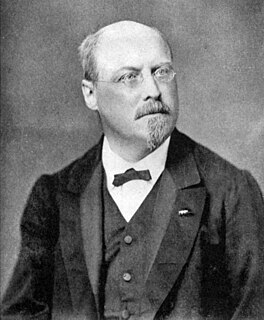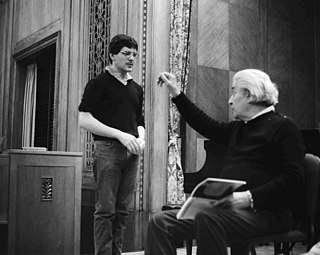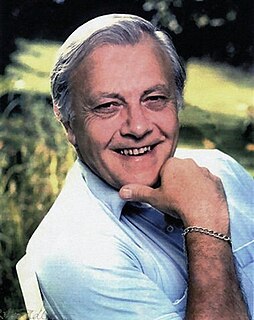Related Research Articles

Charles Edward Ives was an American modernist composer, one of the first American composers of international renown. His music was largely ignored during his early life, and many of his works went unperformed for many years. Later in life, the quality of his music was publicly recognized, and he came to be regarded as an "American original". He was also among the first composers to engage in a systematic program of experimental music, with musical techniques including polytonality, polyrhythm, tone clusters, aleatory elements, and quarter tones. His experimentation foreshadowed many musical innovations that were later more widely adopted during the 20th century. Hence, he is often regarded as the leading American composer of art music of the 20th century.

The London Symphony Orchestra (LSO) is a British symphony orchestra based in London. Founded in 1904, the LSO is the oldest of London's symphony orchestras. The LSO was created by a group of players who left Henry Wood's Queen's Hall Orchestra because of a new rule requiring players to give the orchestra their exclusive services. The LSO itself later introduced a similar rule for its members. From the outset the LSO was organised on co-operative lines, with all players sharing the profits at the end of each season. This practice continued for the orchestra's first four decades.

Bernard Herrmann was an American composer and conductor best known for his work in composing for films. As a conductor, he championed the music of lesser-known composers. He is widely regarded as one of the greatest film composers.

Leopold Anthony Stokowski was an English conductor. One of the leading conductors of the early and mid-20th century, he is best known for his long association with the Philadelphia Orchestra and his appearance in the Disney film Fantasia with that orchestra. He was especially noted for his free-hand conducting style that spurned the traditional baton and for obtaining a characteristically sumptuous sound from the orchestras he directed.

William Howard Schuman was an American composer and arts administrator.

Bernard Johan Herman Haitink was a Dutch conductor and violinist. He was the principal conductor of several international orchestras, beginning with the Royal Concertgebouw Orchestra in 1961. He moved to London, as principal conductor of the London Philharmonic Orchestra from 1967 to 1979, music director at Glyndebourne Opera from 1978 to 1988 and of the Royal Opera House from 1987 to 2002, when he became principal conductor of the Staatskapelle Dresden. Finally, he was principal conductor of the Chicago Symphony Orchestra from 2006 to 2010. The focus of his prolific recording was classical symphonies and orchestral works, but he also conducted operas. He conducted 90 concerts at The Proms in London, the last on 3 September 2019 with the Vienna Philharmonic. His awards include Grammy Awards and the 2015 Gramophone Award for his lifetime achievements.

Joseph Joachim Raff was a German-Swiss composer, pedagogue and pianist.
The Gramophone Classical Music Awards, launched in 1977, are one of the most significant honours bestowed on recordings in the classical record industry. They are often viewed as equivalent to or surpassing the American Grammy award, and referred to as the Oscars for classical music. They are widely regarded as the most influential and prestigious classical music awards in the world. According to Matthew Owen, national sales manager for Harmonia Mundi USA, "ultimately it is the classical award, especially worldwide."

Felix Mendelssohn's Violin Concerto in E minor, Op. 64, is his last concerto. Well received at its premiere, it has remained among the most prominent and highly-regarded violin concertos. It holds a central place in the violin repertoire and has developed a reputation as an essential concerto for all aspiring concert violinists to master, and usually one of the first Romantic era concertos they learn. A typical performance lasts just under half an hour.
Julian Anderson is a British composer and teacher of composition.
A London Symphony is the second symphony composed by Ralph Vaughan Williams. The work is sometimes referred to as Symphony No. 2, though the composer did not designate that name for the work. First performed in 1914, the original score of this four-movement symphony was lost and subsequently reconstructed. Vaughan Williams continued revisions of the work into its final definitive form, which was published in 1936.
The National Philharmonic Orchestra was a British orchestra created exclusively for recording purposes. It was founded by RCA Records producer and conductor Charles Gerhardt and orchestra leader and contractor Sidney Sax. The orchestra was created partly due to the requirements of an extensive recording project for the Reader's Digest.

Falstaff – Symphonic Study in C minor, Op. 68, is an orchestral work by the English composer Edward Elgar. Though not so designated by the composer, it is a symphonic poem in the tradition of Franz Liszt and Richard Strauss. It portrays Sir John Falstaff, the "fat knight" of William Shakespeare's Henry IV Parts 1 and 2.

Patrick Moody Williams was an American composer, arranger, and conductor who worked in many genres of music, and in film and television.

David Bernard is an American orchestral conductor.

Derek Gleeson is an Irish/American musician. Born in Dublin, Ireland. He is currently the music director and conductor of the Dublin Philharmonic Orchestra and has been the conductor at the Anna Livia Dublin International Opera Festival. Since 2012 Gleeson is also music director & conductor of the Rachmaninov Festival Orchestra. Since January 2016 Gleeson is Principal Guest Conductor or The Harbin Symphony Orchestra, Harbin, China. He also composes musical scores for film and television and of symphonic music for the concert hall.

Kenneth Alwyn was a British conductor, composer, and writer. Described by BBC Radio 3 as "one of the great British musical directors", Alwyn was known for his many recordings, including with the London Symphony Orchestra on Decca's first stereophonic recording of Tchaikovsky's 1812 Overture. He was also known for his long association with BBC Radio 2's orchestral live music programme Friday Night is Music Night, appearing for thirty years as a conductor and presenter, and for his contribution to British musical theatre as a prolific musical director in the 1950s and 1960s. He was a Fellow of the Royal Academy of Music and married the actress Mary Law in 1960. His website and the first volume of his memoirs A Baton in the Ballet and Other Places were both published in 2015. The second volume Is Anyone Watching? was published in 2017. A Book of Remembrance was opened on his website in December 2020.
Symphony No. 2, Op. 132, Mysterious Mountain is a three-movement orchestral composition by the Armenian-American composer Alan Hovhaness. The symphony was commissioned by the conductor Leopold Stokowski and the Houston Symphony, and premiered live on NBC television in October 1955 on the Houston Symphony's first program with Stokowski as conductor. The first and most popular recording of the work, released in 1958 with the Chicago Symphony Orchestra performing under Fritz Reiner, is often regarded as the foremost performance of the piece. This recording, like early performances of the work, predates the composer's decision to categorize the work "symphony". Later on, the G. Schirmer published score was titled Mysterious Mountain with "Symphony No. 2" printed as a subtitle in smaller typeface.
Moby Dick is a dramatic cantata for two tenors, two basses, male chorus, and orchestra by the American composer Bernard Herrmann with a libretto by Clark Harrington based on Herman Melville's eponymous novel. The work was composed between February 1937 and August 1938 while Herrmann was music director at CBS and it was premiered in 1940 at Carnegie Hall in New York City by the New York Philharmonic under the conductor John Barbirolli. The piece is dedicated to Herrmann's friend and fellow composer Charles Ives.
The Concerto for Orchestra is an orchestral composition by the American composer Joan Tower. The work was jointly commissioned by the St. Louis Symphony, the Chicago Symphony Orchestra, and the New York Philharmonic.
References
- 1 2 3 4 Smith, p. 88-89
- ↑ Ford, Mark (March 8, 2011). "Herrmann Centennial Concert Work Series: Symphony No. 1". Film Score Monthly . Retrieved February 5, 2015.
- 1 2 Imperato, Albert (July 7, 2011). "My Weekend With Bernie: Getting beyond Herrmann's famed film scores". Gramophone . Retrieved February 5, 2015.
- ↑ Gittis, Brian (June 23, 2011). "Who is Bernard Herrmann?". The Paris Review . Retrieved February 5, 2015.